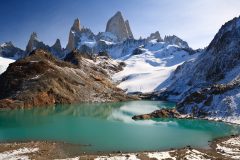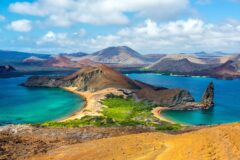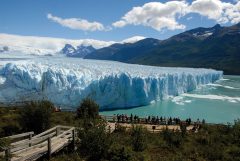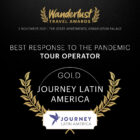

Argentina FAQs
When is the best time to visit Argentina?
Argentina is so large it’s always a good time to go somewhere. The southern hemisphere summer is the reverse of our own, with Dec-Feb being high summer in Patagonia. Spring (Oct-Nov) and Autumn (Mar-Apr) can still be very pleasant and are quieter. While summers in the lake district are reliably warm and sunny, the further south in Patagonia you go the more unpredictable the weather. In Winter (June-Sept) some hotels in Patagonia close, while others stay open for skiers. Buenos Aires, Mendoza and Córdoba enjoy a Mediterranean-type climate, with cool winters and very warm summers. North-west Argentina (Salta and Jujuy) enjoy sunshine and warm temperatures year-round but are influenced by altitude and the high Andes, with occasional cold snaps (June-Sept) and a rainy season (Jan-Feb). Iguazú Falls and Misiones has a subtropical climate, although it can be chilly July-Sept.
For more detailed information visit our When To Go section.
What is the official language of Argentina?
The official language of Argentina is Spanish.
What is Argentina's official currency?
The official currency of Argentina is the Argentine Peso.
Although cards have become more widely accepted, cash remains useful in Argentina so don’t rely solely on your cards. Taking funds in a mix of formats (a supply of US$ cash to convert into Pesos locally, along with your cards) is a sensible plan. In Buenos Aires and main tourist hubs you should have few problems paying by card but in more remote areas often only cash is accepted. You’ll also need cash for tips (eg if you pay for a restaurant meal with a card, tips are always left in cash). When changing money, denominations of US$50 and US$100 are usually preferred and you should make sure your notes are in perfect condition. Although ATMs are available, local ATM fees are high and the amount you can take out is lower than in the UK. We tend to avoid them.
We think it’s a good idea to keep an eye on Argentina’s exchange rates before you go. In addition to the official (BNA) rate of exchange for converting your US Dollars to Pesos, Argentina also uses a parallel exchange rate for foreign tourists (MEP). This is about 15% better than the official rate. Some casas de cambio will automatically apply the better tourist rate when changing your money. Others will only apply the official (BNA) rate. Rates used to process credit/debit card transactions can vary between card issuers, but you should find you get something between the official and tourist rates. Check your statement.
Try not to end up with a lot of leftover Pesos at the end of your time in Argentina, as it is difficult to change them to other currencies. You should be able to spend them at the Duty Free shop at Buenos Aires airport.
Please note that given the changeable situation with the Argentine economy, currency matters can change at short notice.
What's the time difference between Argentina and UK?
The time difference between Argentina and UK is GMT -3 hrs. Sometimes daylight saving is observed in the summer, from Sep/Oct to early Mar, but not every year.
Do I need a visa for Argentina?
Holders of a full British passport do not require a visa, although passports must be valid for at least 6 months after the trip begins. Anyone with a different nationality should enquire with us or check with the relevant consulate.
If flying to the US, or via the US you will need to fill in your online ESTA application.
What vaccinations do I need for Argentina?
Please check Travel Health Pro for information on health recommendations and vaccinations for the destinations you are visiting. Please note that many Latin American countries require proof of vaccination against Yellow Fever if you have recently travelled to another country where Yellow Fever is present.
Which other countries combine well with Argentina?
Chile, accessing the country by crossing the Andes over one of several scenic passes: from Salta in the northwest to the Atacama Desert, from Mendoza to Santiago, via the lakes crossing from Bariloche to Puerto Varas in the lake district and from El Calafate to Torres del Paine in Patagonia; Brazil, via the land crossing at Iguazú.
What are the festivals and other cultural or sporting events in Argentina?
• Tango Festival: Buenos Aires, August.
• Polo Open: Buenos Aires province, weekends in November.
• Gaucho Festivals: The pampas, early November.
How do I adapt to the altitude in Argentina?
Whilst a typical holiday in Patagonia presents no challenges with altitude, Argentina’s north-western provinces offer a taste of the high Andes with some spectacular road trips on offer. Travel to high altitude can cause mountain sickness and even if you feel fighting fit it’s important to take things easy and stay hydrated (drink plenty of water, avoiding alcohol and caffeine) as you get used to the thin, dry air. You may initially notice a headache, dizziness or breathlessness and this usually improves with acclimatisation. If you are pregnant or taking the contraceptive pill, have a medical condition such as heart or lung condition, anaemia, asthma, high blood pressure you should seek the advice of your GP before booking. We also recommend you check your travel insurance covers travel to high altitude. If you’re taking the family, remember small children may be less capable of communicating altitude-related symptoms effectively: keep an eye on them too. Rest assured we will plan your itinerary carefully, taking into account any time spent at altitude. If you have any questions or concerns about altitude please speak to your travel expert.
Further advice on travel to altitude is available on www.travelhealthpro.org.uk
If you still have questions, please contact us and one of our Travel Experts will be happy to help.
Papagaio
Your edit for Latin American inspiration
Our exciting range of articles on Latin America explore everything from iconic destinations and lesser-known cultural gems to delicious traditional recipes. You’ll also find exclusive travel tips, first-hand client reviews and the chance to get your personal questions answered by our travel experts.
View Extraordinary Inspiration




































